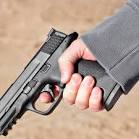It is important to know your rights. Kentucky has both Castle Doctrine and Stand your Ground Laws to protect your rights.
If you have been involved, contact an attorney as soon as possible!! The following is taken from article published by USCCA.
Rights After a Self-Defense Shooting
Let’s talk about your rights after you shoot someone in self-defense. Before your attorney arrives, you should take note of any seemingly insignificant details that might actually serve as evidence and keep quiet. In the July 2023 issue of Concealed Carry Magazine1, author Paul Peng recommended that your statement to the police be short and sweet: “I defended myself because I was in fear for my life.” He said that simply saying you were scared will paint an incorrect picture of the incident and will end up being used against you in court. Remember, anything and everything you say can and will be used against you in court.
Leave the rest up to a skilled criminal defense attorney. It’s noteworthy that the circumstances under which you must be given the Miranda warning are actually quite limited. Don’t wait around for the police to read you your Miranda rights! After providing the aforementioned information, let the investigating officers know that you’re willing to cooperate but are awaiting your attorney. The best defense you have during this time period is observing your Fifth Amendment right to silence.
Following an emotionally charged and high-adrenaline event like a self-defense shooting, logical thinking may become more difficult. Your sense of time may be skewed, and you might forget important details. In fact, your brain might even fill in some gaps with false memories. Give yourself time to process and sort it all out, and enlist the help of an attorney to navigate through the aftermath of the self-defense incident.
Remember, if you ever find yourself in a situation where you need to shoot someone in self-defense, these steps can make a significant difference. Even police officers are recommended to wait a certain amount of time before filling out a report on incidents to prevent false memories and to improve memory recall of important details. If you have taken a USCCA Concealed Carry & Home Defense Fundamentals class to get your CCW permit, you’ll be familiar with this “waiting period” to let your biological responses settle down.
Self-Defense Legal Proceedings Are Not Like TV
Your attorney, despite what Law & Order has led you to believe, is not going to kick in the door of the jail or the interrogation room and tell the detectives to leave. You need to raise your own rights. No one can do it for you.
Most often, unless there is a flight risk, police will do a “book and release” after your interview. It’s difficult to predict exactly what is going to happen or how long you will be held, but it will be longer than a 55-minute episode of a cop show leads you to believe. The process can be easier if you avoid critical errors, however. Assuming you did the right thing when defending yourself, and it was a good shoot, your release will be smooth. The right defensive firearms training and legal knowledge can help to make the aftermath of a self-defense incident easier.
Taken for Questioning Following a Shooting
It’s important again to remember that procedures will vary based on the jurisdiction you’re in. At this point in most cases, an officer will take you to an interrogation room and record your answers to a battery of questions. The officer may try to “blitz” you with questions, coming at you kind of hard. He may also try to be your friend, offering coffee and “just trying to understand.”
Navigating the Police Interrogation
The interrogating officer will most likely be a different cop than the one on the scene. So, he or she will know less about what happened than the person you were dealing with before. It is important to already have your legal representation with you at this point, if possible. During this critical time, USCCA can offer support with its 24/7 access Attorney Network, with attorneys across the U.S. who are on your side and believe in your right to self-defense. Even if you select a different attorney after this interrogation, having an attorney on hand will help your case and prevent any missteps that could land you wrongfully imprisoned for a legal act of self-defense.
You will most likely, however, be on your own for the first few hours after shooting someone in self-defense before your attorney can get there. Raise your rights and then stop talking. And know the difference between those rights. If you raise your right to silence, the police can continue to badger you and ask you questions. When you ask for your attorney, the police have to disengage. But if you start talking, you have waived your rights. You have now made a voluntary statement.
Getting Out of Jail After a Self-Defense Incident
The timeline for when you can get out will vary from place to place and in differing situations. You may be charged at hour 47 of 48, which starts a new timeline. Remember, you’ll get much further with law enforcement if you’re polite. The police are not holding you maliciously; they’re just trying to find the facts. They may ask you the same question over and over again trying to get to the truth. The interview process may last 30 to 60 minutes, or it may last seven to eight hours.
Keep your cool. Ask for your attorney. Take the time you need to sort out what happened. Be polite. Stick to the facts.
Michael Bouldin has been a member of the USCCA quick response team of attorneys for over 10 years. In Kentucky, contact Michael W. Bouldin by using contact form, email [email protected] or call 859-581-6453 (581-MIKE).


